动名词用法
- 格式:doc
- 大小:144.50 KB
- 文档页数:9
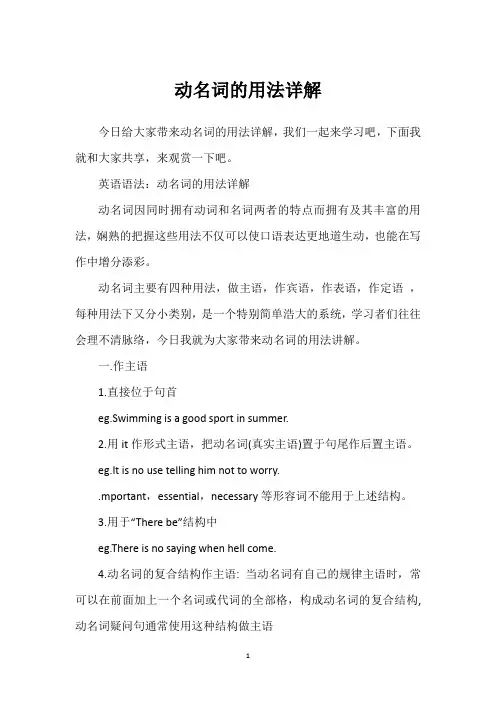
动名词的用法详解今日给大家带来动名词的用法详解,我们一起来学习吧,下面我就和大家共享,来观赏一下吧。
英语语法:动名词的用法详解动名词因同时拥有动词和名词两者的特点而拥有及其丰富的用法,娴熟的把握这些用法不仅可以使口语表达更地道生动,也能在写作中增分添彩。
动名词主要有四种用法,做主语,作宾语,作表语,作定语,每种用法下又分小类别,是一个特别简单浩大的系统,学习者们往往会理不清脉络,今日我就为大家带来动名词的用法讲解。
一.作主语1.直接位于句首eg.Swimming is a good sport in summer.2.用it作形式主语,把动名词(真实主语)置于句尾作后置主语。
eg.It is no use telling him not to worry..mportant,essential,necessary等形容词不能用于上述结构。
3.用于“There be”结构中eg.There is no saying when hell come.4.动名词的复合结构作主语: 当动名词有自己的规律主语时,常可以在前面加上一个名词或代词的全部格,构成动名词的复合结构,动名词疑问句通常使用这种结构做主语eg.Their coming to help was a great encouragement to us.Does your saying that mean anything to him?二.作宾语1.作动词的宾语某些动词后消失非限定性动词时只能用动名词作宾语,不能用不定式。
不定式通常指某种特定的动作,但动名词表示泛指,常见的此类动词有:admit,appreciate,excuse,stand,advise,allow,permit,avoid,consider,enjoy,f inish,give up,cannot help,imagine,include,keep,understand,keepon,mind,report,risk,miss,put off,delay,practise,resist,suggest,depend on,think about,set about,succeed in,worry about,burst out,insist on,feel like,be used to,get used to,devote…to…,look forward to,pay attention to,get down to,escape and so on.eg.They went on walking and never stopped talking.他们连续走,说个不停。
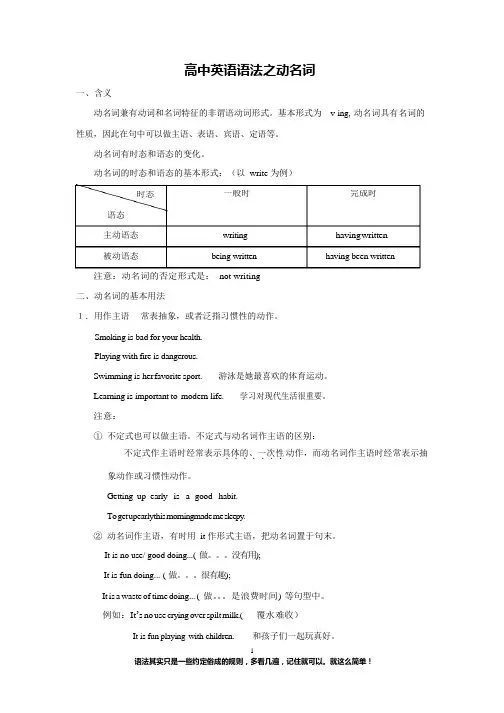
高中英语语法之动名词一、含义动名词兼有动词和名词特征的非谓语动词形式。
基本形式为v-ing, 动名词具有名词的性质,因此在句中可以做主语、表语、宾语、定语等。
动名词有时态和语态的变化。
动名词的时态和语态的基本形式:(以write 为例)时态一般时完成时语态主动语态writing having written被动语态being written having been written 注意:动名词的否定形式是:not writing二、动名词的基本用法1.用作主语--- 常表抽象,或者泛指习惯性的动作。
Smoking is bad for your health.Playing with fire is dangerous.Swimming is her favorite sport. 游泳是她最喜欢的体育运动。
Learning is important to modern life. 学习对现代生活很重要。
注意:①不定式也可以做主语。
不定式与动名词作主语的区别:不定式作主语时经常表示具.体.的.、.一.次.性.动作,而动名词作主语时经常表示抽象动作或习惯性动作。
Getting up early is a good habit.To get upearlythis morningmade me sleepy.②动名词作主语,有时用it 作形式主语,把动名词置于句末。
It is no use/ good doing...( 做。
没有用);It is fun doing... ( 做。
很有趣);It is a waste of time doing... ( 做。
是浪费时间) 等句型中。
例如:It’s no use crying over spilt milk.( 覆水难收)It is fun playing with children. 和孩子们一起玩真好。
It is a waste of time persuading such a person to join us.说服这样一个人加入我们当中来是浪费时间。

动名词是一种非谓语动词,既具有动词性质又具有名词性质。
它具有名词的性质,可以用在主语及宾语等位置,同时也可以组成动名词短语,如:My job is arranging the agenda for my boss.我的工作是为老板安排日程。
I finished the project in a month by working overtime.我靠加班在一个月内做完了这个项目。
动名词也可以用作表语、定语等成分。
以上信息仅供参考,如果还有疑问,建议查阅英语语法书或询问英语老师。
动名词的用法相对比较复杂,但是掌握其基本用法对于理解和运用英语语法非常重要。
以下是一些动名词的基本用法:1. 作主语:动名词可以作为主语,代替一个句子或短语,表达一个完整的概念。
例如:Reading books is my favorite hobby. 读书是我最喜欢的爱好。
2. 作宾语:动名词可以作为动词的宾语,表示动作或行为的对象。
例如:They enjoy playing football. 他们喜欢踢足球。
3. 作表语:动名词可以作为表语,表示主语的状态或性质。
例如:My job is making furniture. 我的工作是制造家具。
4. 作定语:动名词可以作为定语,修饰名词或代词,表示其性质或状态。
例如:The company's main business is making furniture. 公司的主要业务是制造家具。
除了以上基本用法,动名词还可以在句中构成复杂的结构,如动名词短语、动名词分词等。
这些用法需要结合具体的语境和语法规则进行理解和运用。
总之,动名词是英语语法中的一个重要概念,掌握其基本用法可以帮助我们更好地理解和运用英语。
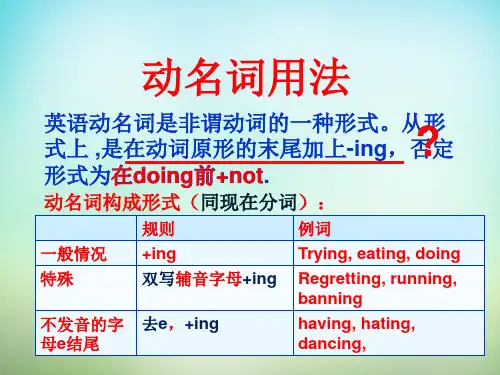
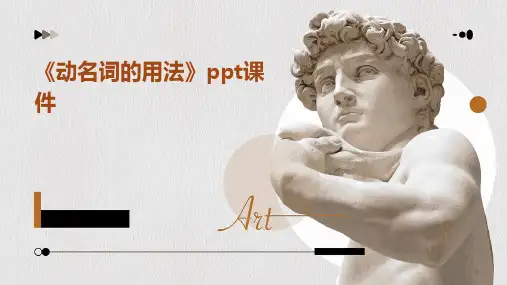
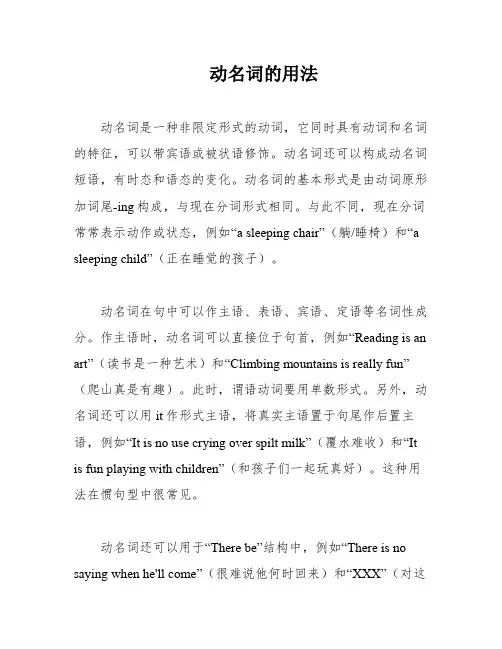
动名词的用法动名词是一种非限定形式的动词,它同时具有动词和名词的特征,可以带宾语或被状语修饰。
动名词还可以构成动名词短语,有时态和语态的变化。
动名词的基本形式是由动词原形加词尾-ing构成,与现在分词形式相同。
与此不同,现在分词常常表示动作或状态,例如“a sleeping chair”(躺/睡椅)和“a sleeping child”(正在睡觉的孩子)。
动名词在句中可以作主语、表语、宾语、定语等名词性成分。
作主语时,动名词可以直接位于句首,例如“Reading is an art”(读书是一种艺术)和“Climbing mountains is really fun”(爬山真是有趣)。
此时,谓语动词要用单数形式。
另外,动名词还可以用it作形式主语,将真实主语置于句尾作后置主语,例如“It is no use crying over spilt milk”(覆水难收)和“It is fun playing with children”(和孩子们一起玩真好)。
这种用法在惯句型中很常见。
动名词还可以用于“There be”结构中,例如“There is no saying wh en he'll come”(很难说他何时回来)和“XXX”(对这种事情不是开玩笑)。
需要注意的是,形容词important、essential和necessary等后面不能用动名词,而应该使用不定式。
The wheel of history cannot be ped。
This common phrase XXX.Common sentence structure: There is no + gerund = It isXXX do。
Note: In the "There be" sentence structure。
only gerunds can be used as the subject。
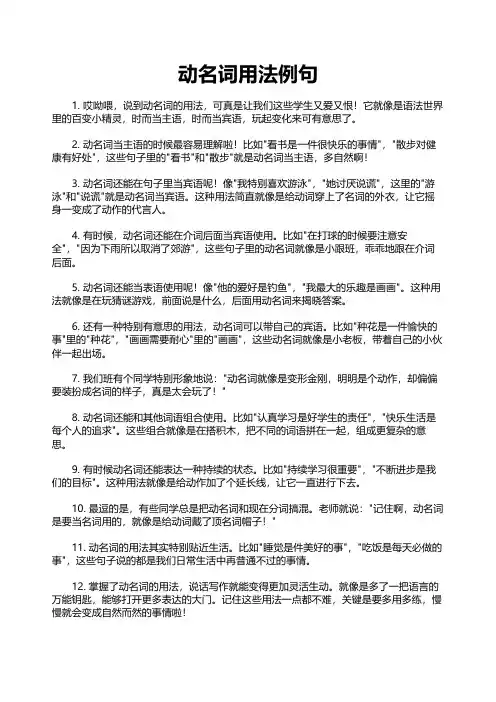
动名词用法例句1. 哎呦喂,说到动名词的用法,可真是让我们这些学生又爱又恨!它就像是语法世界里的百变小精灵,时而当主语,时而当宾语,玩起变化来可有意思了。
2. 动名词当主语的时候最容易理解啦!比如"看书是一件很快乐的事情","散步对健康有好处",这些句子里的"看书"和"散步"就是动名词当主语,多自然啊!3. 动名词还能在句子里当宾语呢!像"我特别喜欢游泳","她讨厌说谎",这里的"游泳"和"说谎"就是动名词当宾语。
这种用法简直就像是给动词穿上了名词的外衣,让它摇身一变成了动作的代言人。
4. 有时候,动名词还能在介词后面当宾语使用。
比如"在打球的时候要注意安全","因为下雨所以取消了郊游",这些句子里的动名词就像是小跟班,乖乖地跟在介词后面。
5. 动名词还能当表语使用呢!像"他的爱好是钓鱼","我最大的乐趣是画画"。
这种用法就像是在玩猜谜游戏,前面说是什么,后面用动名词来揭晓答案。
6. 还有一种特别有意思的用法,动名词可以带自己的宾语。
比如"种花是一件愉快的事"里的"种花","画画需要耐心"里的"画画",这些动名词就像是小老板,带着自己的小伙伴一起出场。
7. 我们班有个同学特别形象地说:"动名词就像是变形金刚,明明是个动作,却偏偏要装扮成名词的样子,真是太会玩了!"8. 动名词还能和其他词语组合使用。
比如"认真学习是好学生的责任","快乐生活是每个人的追求"。
这些组合就像是在搭积木,把不同的词语拼在一起,组成更复杂的意思。
9. 有时候动名词还能表达一种持续的状态。
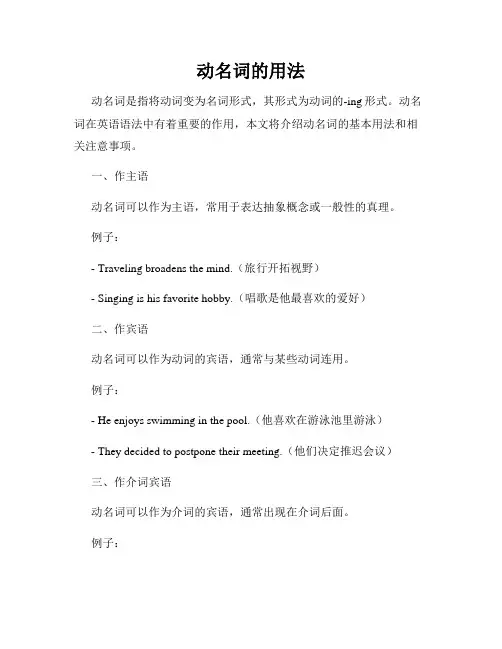
动名词的用法动名词是指将动词变为名词形式,其形式为动词的-ing形式。
动名词在英语语法中有着重要的作用,本文将介绍动名词的基本用法和相关注意事项。
一、作主语动名词可以作为主语,常用于表达抽象概念或一般性的真理。
例子:- Traveling broadens the mind.(旅行开拓视野)- Singing is his favorite hobby.(唱歌是他最喜欢的爱好)二、作宾语动名词可以作为动词的宾语,通常与某些动词连用。
例子:- He enjoys swimming in the pool.(他喜欢在游泳池里游泳)- They decided to postpone their meeting.(他们决定推迟会议)三、作介词宾语动名词可以作为介词的宾语,通常出现在介词后面。
例子:- Are you interested in learning a new language?(你对学习一门新语言感兴趣吗?)- She is good at playing the piano.(她擅长弹钢琴)四、作定语动名词可以作为名词的修饰语,用来表示被修饰名词的用途、目的等。
例子:- The writing room is for staff only.(写作室仅对员工开放)- I bought an exercise book for practicing writing.(我买了一本练习写作的练习册)五、作宾语补足语动名词可以作为某些及物动词的宾语补足语,用来补充说明宾语的具体内容。
例子:- I find it fascinating talking to people from different cultures.(我觉得和来自不同文化背景的人交谈很有趣)- He considers playing football a waste of time.(他认为踢足球是浪费时间)六、作动词不定式的替代在某些情况下,动名词可以替代动词不定式。
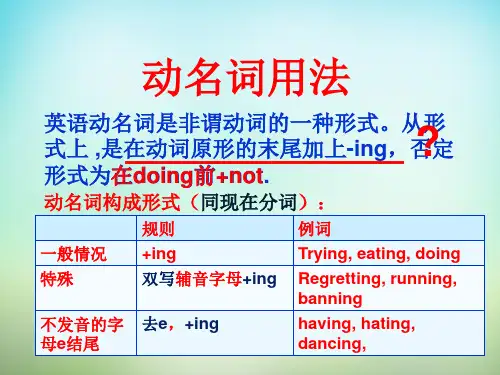
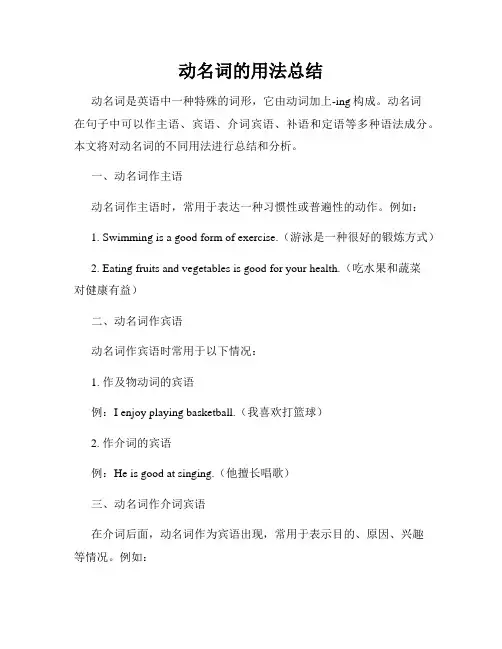
动名词的用法总结动名词是英语中一种特殊的词形,它由动词加上-ing构成。
动名词在句子中可以作主语、宾语、介词宾语、补语和定语等多种语法成分。
本文将对动名词的不同用法进行总结和分析。
一、动名词作主语动名词作主语时,常用于表达一种习惯性或普遍性的动作。
例如:1. Swimming is a good form of exercise.(游泳是一种很好的锻炼方式)2. Eating fruits and vegetables is good for your health.(吃水果和蔬菜对健康有益)二、动名词作宾语动名词作宾语时常用于以下情况:1. 作及物动词的宾语例:I enjoy playing basketball.(我喜欢打篮球)2. 作介词的宾语例:He is good at singing.(他擅长唱歌)三、动名词作介词宾语在介词后面,动名词作为宾语出现,常用于表示目的、原因、兴趣等情况。
例如:1. I went to the park for walking my dog.(我去公园遛狗)2. She apologized to her friend for making a mistake.(她对她的朋友道了歉,因为犯了一个错误)四、动名词作补语动名词可以作某些动词的补语,这些动词包括keep, catch, find, imagine等。
例如:1. I caught him stealing my money.(我抓到他偷我的钱)2. He found his cat sleeping on the sofa.(他发现他的猫在沙发上睡觉)五、动名词作定语动名词可以作修饰名词的定语,常出现在名词前面。
例如:1. The running water is so clear.(流动的水非常清澈)2. I saw a dancing girl on the stage.(我在舞台上看到了一个跳舞的女孩)总结:动名词可以作主语、宾语、介词宾语、补语和定语等多种语法成分。
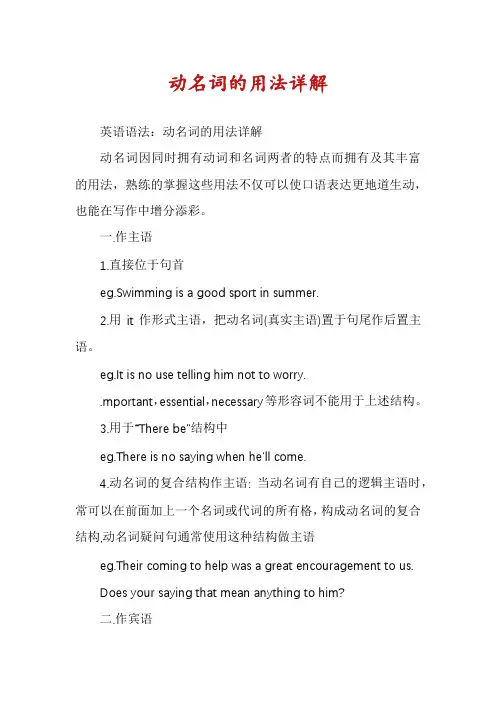
动名词的用法详解英语语法:动名词的用法详解动名词因同时拥有动词和名词两者的特点而拥有及其丰富的用法,熟练的掌握这些用法不仅可以使口语表达更地道生动,也能在写作中增分添彩。
一.作主语1.直接位于句首eg.Swimming is a good sport in summer.2.用it作形式主语,把动名词(真实主语)置于句尾作后置主语。
eg.It is no use telling him not to worry..mportant,essential,necessary等形容词不能用于上述结构。
3.用于“There be”结构中eg.There is no saying when he'll come.4.动名词的复合结构作主语: 当动名词有自己的逻辑主语时,常可以在前面加上一个名词或代词的所有格,构成动名词的复合结构,动名词疑问句通常使用这种结构做主语eg.Their coming to help was a great encouragement to us.Does your saying that mean anything to him?二.作宾语1.作动词的宾语某些动词后出现非限定性动词时只能用动名词作宾语,不能用不定式。
不定式通常指某种特定的动作,但动名词表示泛指,常见的此类动词有:admit,appreciate,excuse,stand,advise,allow,permit,avoid,consider ,enjoy,finish,give up,cannot help,imagine,include,keep,understand,keepon,mind,report,risk,m iss,put off,delay,practise,resist,suggest,depend on,think about,set about,succeed in,worry about,burst out,insist on,feel like,be used to,get used to,devote。
动名词的用法动名词是英语语法中的一个重要概念。
它可以起名词的作用,因此可以用作主语、宾语、表语、介词宾语等。
此外,动名词也可以用作形容词或副词的补语,或者在复合句中起连接语的作用。
接下来,本文将详细介绍动名词的各种用法和注意事项。
一、动名词作主语动名词作主语时,通常表示一种习惯、家庭、嗜好、职业、情感、思考等抽象概念,而不是具体的物质和行为。
例句:- Swimming is a wonderful way to keep fit. 游泳是保持健康的一种绝妙方式。
- Studying abroad is his dream. 出国留学是他的梦想。
- Helping others is a virtue. 帮助他人是一种美德。
- Writing poems is his hobby. 写诗是他的爱好。
二、动名词作宾语动名词作宾语时,通常表示一种行为、活动、计划等。
常见的动词包括admit, appreciate, avoid, postpone, practice等。
例句:- I enjoy reading books. 我喜欢读书。
- He avoids speaking in public. 他避免在公众场合讲话。
- The company is considering expanding overseas. 公司正在考虑扩展海外市场。
- She decided to postpone her wedding. 她决定推迟婚礼。
三、动名词作表语动名词作表语时,通常表示一种状态或特点。
常见的动词包括 be, become, seem, feel等。
例句:- Her favorite leisure activity is swimming. 她最喜欢的休闲活动是游泳。
- The idea of traveling alone seemed daunting to him. 独自旅行的想法对他来说看起来很艰巨。
非谓语动词语法:动名词的用法在英语语法中,动名词是一种非谓语动词形式,它具有动词和名词的特点。
动名词以-ing结尾,并且可以作为名词使用,用于表达一种动作、状态或感受。
本文将介绍动名词的用法及相关注意事项。
1. 动名词作主语动名词可以作为句子的主语,通常位于句首。
例如:•Running is good for your health.(跑步对健康有好处。
)•Swimming is my favorite sport.(游泳是我最喜欢的运动。
)2. 动名词作宾语动名词可以作及物动词的宾语。
例如:•I enjoy playing basketball.(我喜欢打篮球。
)•She admitted stealing money.(她承认偷了钱。
)需要注意的是,某些动词后面既可以接动名词,也可以接不定式。
例如,下面的动词可以接动名词或不定式作宾语:•想要(want)•喜欢(like)•开始(start)•继续(continue)•停止(stop)•完成(finish)动名词作宾语时,可以加上介词to,以表示目的或意图。
例如:•He is looking forward to meeting his friends.(他期待着见到他的朋友。
)•I am used to waking up early.(我习惯早起。
)3. 动名词作定语动名词可以作为名词的定语,用于修饰名词。
例如:•The running water is very clear.(流动的水非常清澈。
)•I need a writing pen.(我需要一支写字的笔。
)4. 动名词作表语动名词可以作为动词be的表语。
例如:•His favorite activity is playing guitar.(他最喜欢的活动是弹吉他。
)5. 动名词作宾语补足语动名词可以作为及物动词的宾语补足语,用于补充说明主语的动作。
例如:•I found him reading a book in the library.(我在图书馆发现他在读书。
动名词的三种用法动名词是英语语法中的一种非常重要的语法形式,可以作为主语、宾语、定语、表语等,同时也可以用来表示一些特定的意义。
下面将介绍动名词的三种用法。
一、作主语动名词作主语时,通常表示某个具体的行为或状态,例如:- Swimming is my favorite hobby.(游泳是我最喜欢的爱好。
) - Reading books can broaden our knowledge.(读书可以拓宽我们的知识。
)二、作宾语动名词作宾语时,通常表示某个动作或行为的对象,例如:- I enjoy playing basketball.(我喜欢打篮球。
)- She hates doing housework.(她讨厌做家务。
)三、作定语动名词作定语时,通常表示修饰名词的一种方式,起到限定、具体化的作用,例如:- The running water in the river is very clear.(河中流动的水非常清澈。
)- The crying baby needs to be comforted.(哭泣的婴儿需要被安抚。
)除了以上三种常见的用法,动名词还可以表示一些特定的意义,例如:- V-ing + V-ed:表示同时或顺序进行的两个动作,如:He sat there, reading a book and drinking tea.(他坐在那里,一边看书一边喝茶。
)- V-ing + to-inf:表示动作的目的,如:He went there, hoping to meet his friend.(他去那里,希望能见到他的朋友。
)- V-ing + V-ing:表示两个动作同时进行,如:She was walking down the street, humming a song.(她一边走在街上,一边哼着歌。
)总之,动名词的用法非常丰富多样,对于英语学习者来说,掌握好动名词的使用,能够更加流利自如地表达自己的意思。
动名词的用法动名词(Gerund)是英语中一种特殊的动词形式,它以-ing结尾,并且在句中起名词的作用。
动名词可以作为主语、宾语、介词宾语和表语等,具有多种用法。
本文将详细介绍动名词的用法及相应的例句。
一、作为主语动名词可以作为句子的主语,在句子中起到了名词的作用。
以下是一些常见的用法示例:1.Playing basketball is my favorite sport.–打篮球是我最喜欢的运动。
2.Learning languages requires time and patience.–学习语言需要时间和耐心。
3.Swimming is good for your health.–游泳对身体健康有益。
二、作为宾语动名词可以作为及物动词的宾语,跟在动词后面。
以下是一些常见的用法示例:1.I enjoy reading books in my free time.–我空闲时喜欢读书。
2.They avoid eating junk food.–他们避免吃垃圾食品。
3.She prefers watching movies to going shopping.–她喜欢看电影而不是逛街。
三、作为介词宾语动名词可以作为介词的宾语,放在介词后面。
以下是一些常见的用法示例:1.He is good at playing the piano.–他擅长弹钢琴。
2.We are interested in learning new things.–我们对学习新事物感兴趣。
3.She is afraid of flying in airplanes.–她害怕坐飞机。
四、作为表语动名词可以作为系动词的表语,说明主语的身份或特征。
以下是一些常见的用法示例:1.Her favorite activity is painting.–她最喜欢的活动是绘画。
2.The best thing for you is relaxing.–对你来说最好的事情是放松。
动名词举例动名词是英语语法中的一个重要概念,在英语中起着多种语法和语义的作用。
本文将对动名词进行详细的阐述,包括其定义、用法、特点以及举例等方面,旨在帮助读者更好地理解和掌握动名词的用法。
一、动名词的定义与用法动名词是动词变形的一种形式,在句子中可以作名词使用。
动名词的构成方式为动词+ing(如:walking、talking),其主要有以下几种用法:1.作主语:动名词作主语时,通常指一种习惯性或经常性的行为,如:“Running is good for your health.”(跑步对健康有益)。
2.作宾语:动名词作宾语时,表示动作或者状态被实施,如:“I enjoy swimming in the summer.”(夏天我喜欢游泳)。
3.作介词的宾语:动名词作介词的宾语时,常常用于介词的后面,如:“He is interested in playing basketball.”(他对打篮球很感兴趣)。
4.作定语:动名词作定语时,多与名词连用,起修饰限定的作用,如:“A shopping mall is a good place to relax.”(购物中心是一个休闲的好地方)。
二、动名词的特点动名词具有以下几个特点:1.可数与不可数:动名词可以数和不可数,具体是由与其搭配的冠词,量词或表量的形容词来决定。
2.与动词之间的区别:动名词和动词在形式上是相似的,但在语义和用法上有所区别,读者应该注意区分。
3.逻辑主语的形式:在动名词短语中,逻辑主语的形式决定了动名词的格位。
三、动名词的具体用法举例接下来,我们将从各个方面对动名词的用法进行举例阐述,旨在帮助读者更好地理解和掌握动名词的用法。
1.习惯性行为:Doing exercise is good for your health.(锻炼对健康有益)。
2.动作或状态被实施:I love cooking.(我喜欢烹饪)。
3.与介词搭配:She is fond of reading.(她喜欢阅读)。
一、动名词定义动名词是非限定动词的一种形式,由动词原形 +ing 构成。
它既有动词的特征,又有名 词的特征,故称。
动名词也有时态和语态的变化,如表所示(以及物动词 write 为例),不 及物动词没有语态的变化。
二、动名词的作用由于动名词是由动词变化而来,它仍保留着动词的某些特征,具有动词的某些变 化形式,用以表达名词所不能表达的较为复杂的意念。
动名词的名词特征表现在它可 在句子中当名词来用,作主语、宾语、表语、定语。
它也可以被副词修饰或者支配宾 语1、作主语例如:Reading is an art. 读书是一种艺术。
Climbing mountains is really fun. 爬山真是有趣Working in these conditions is not a pleasure but a suffer . 在这种工作条件下工作不是一件愉快的事而是一件痛苦的事。
动名词作主语,在动词的基础上加 Ing,是该动词或动词短语,有名词的各种特征,可作名词灵活使用。
如:It is no use/no good crying over spilt milk. 覆水难收It was hard getting on the crowded street car. 上这种拥挤的车真难。
It is fun playing with children. 和孩子们一起玩真好。
There is no joking about such matters. 对这种事情不是开玩笑。
动名词作主语的几种类型动名词可以在句子中充当名词所能充当的多种句子成分。
在这里仅就动名词在句子中作主语的情况进行讨论。
动名词作主语有如下几种常见情况:〈1〉 直接位于句首做主语。
例如:Swimming is a good sport in summer.〈2〉 用 it 作形式主语,把动名词(真实主语)置于句尾作后置主语。
被动 being written having been written主动 writing having written时态/语态 一般式 完成式动名词做主语时,不太常用 it 作先行主语,多见于某些形容词及名词之后。
动名词用法————————————————————————————————作者:————————————————————————————————日期:ﻩ动名词特征动名词也是动词的一种非限定形式,由动词原形加“-ing”构成,与现在分词同形。
动名词兼有动词和名词的特征和作用,其动词特征表现为可以带宾语、状语或表语。
The manager impressed on hisoffice staff theimportance of keeping accurate records.(带宾语)Workingin theseconditionsis notapleasure buta suffer.(带状语)Censure isthe tax a man paysto the public for being eminent.责难是一个人因为出名而向公众交的税。
(带表语)此外,动名词的动词特征还表现在它的语态和时态变化上。
例如:There is more pleasure in loving than in being loved.(一般被动式)I knownothing about hishaving served inthe army.(完成式)成分(一)作主语1) 动名词作主语往往表示一种概念、习惯或经验Talking mendsno holes. Promising is theeve of giving.Talking to him is talking to a wall.2)有时先用it作形式主语。
把-ing形式置于句尾it isno use/good/useless/ a waste of…/fun/pleasure doing sthit is no use complainingIt'snice seeing youagain. lt is fun playing w ith children.3) “There is+ no 后可以用动名词作主语,表示“没法……”Therewas no telling when this mighthappen again.Thereisno hidingofevil but to doit .比较:Thereis no sense/point/use(in)doingsth(二) 作表语动名词作表语也表示一种概念、习惯或经验。
Seeingisbelieving.眼见为实。
Myjob is teaching senior students English.(三) 做定语表示所修饰名词的用途。
这时,可以改写成由for作定语的短语。
a new swimming suit(=suit forswimming).a walking stickaswimmingpool游泳池 a walking stick拐杖 a reading room a bathing capa changingroom更衣室a waitingroom等候室,候诊室a wateringcan喷壶 a guessing game猜字游戏anironing boardacollec ting tin募捐盒a hidingplace藏身处 a racing bicycle赛车(四)作宾语常跟动名词作宾语的动词或短语有admit承认advise建议allow允许avoid避免cannot help禁不住can'tstand经受不住consider考虑delay推迟enjoy喜欢finish完成give up放弃imagine想象include包括keep保持keep on持续:mind介意miss错过put off推迟permit允许practise 练习resist抵抗suggest建议<避免错过少延期avoid, miss, put off, postpone 建议完成多练习suggest,finish, practice 喜欢想象经不住enjoy,imagine, can't help 承认否定与妒忌admit,deny,envy 逃避冒险莫原谅escape, risk, excuse,忍受保持不介意stand, keep, mind>Avoidovereating I advised takinga differentapproach.2) 许多短语动词也可以用动名词作宾语She keptonworking although shewas tired.在(be)worth后也可跟动名词作宾语: New York is a cityworth visiting3) 有些动词后可以用动名词作宾语,也可用不定式作宾语。
有时两者意思不同, 这类动词有: forget, remember ,forget,mean, try, goonI'11 never forget hearing Chaliapin singing in thatopera.He forgetsto payme I couldn't helpfeeling jealous when hewaspromoted overmy head.4) 有时两种结构只有细微的差别,例如在like,love,prefer,hate,dread等动词之后,动名词多表示一般情况。
不定式多表示即将发生的事, 它们如果用在would后面,只能接不定式形式I prefer walking alone.We preferred to walk there.我们宁愿步行到那里。
He hated thinking/to think about it .She loves having/to have lots ofyoung menround her.I’d like tohave awordwithyou(五)作介词的宾语高中阶段常见带介词的to短语归纳be/get/become used to习惯于begiven to喜欢;癖好berelatedto 与…有关系beaddictedto沉溺于;对…上瘾be opposed to反对devote oneselfto献身于;专心于be devotedto致力于;忠诚于be admitted to 被…录取;准进入be reducedto 沦为reduce…to…使…沦为be attachedto附属于;喜欢;依恋be adjusted to 适应beknown to 为…所知be married to和…结婚be sentenced to被判处beconnected to 和…连在一起be exposed to暴露于;遭受be comparedto 被比喻成compare… to…把…比作…be/become/get accustomedto//accustomed to 惯于;有…习惯be engaged to与…订婚getdown to着手做lead to导致object to反对;不喜欢;不赞成putone’s mindto全神贯注于give riseto引起look forward to盼望payattentionto 注意stick to坚持attendto 专心;注意;照料;see to 负责;注意contribute to对…作贡献;有助于make contributions to对…作贡献apply oneself to致力于come close to几乎;将近reply to回答add to 增加add upto加起来in addition to除…之外turn to转向;求助于feel up to 能胜任于look up to尊敬admit to承认belong to 属于taketo喜爱;开始cling to 附着fallto 开始respond to 回答;对…作出回应accustomoneself to 使自己习惯于amountto等于setan example to给…树立榜样refer to 谈到;参考;查阅agree tosth. 同意某事(比较:agree to dosth. 同意做某事)prefer… to…更喜欢take/make a trip to到…地方去join…to…把…和…连接起来turn a blind eye to对…视而不见turn a deaf earto对…充耳不闻show honour to向…表示敬意put anend to(bring… to an end) 结束drink(atoast)to 为……干杯propose atoastto 提议……set fire to 放火烧……occurtosb.想起;想到total up to总计达beclose to几乎;将近hold to 坚持;抓住help oneselfto 随便用……hold onto 抓住;固守do harmto 对……有害处do wrong to 冤枉某人date back to 追溯到cometo来到;达到;结果为(比较:come to do sth逐渐做某事)when it comesto…谈到……时giveaneye to着眼于have aneye to doing打算describe to向……描述treat sb.tosth.请某人吃……trust sth.to sb.把某物委托给某人pay a visitto参观……the key to……的答案access to进入;取得的方法onone’s way to在去某处的路上;在达成某事的过程中be a strangerto 不习惯;对……陌生be kind to 对……和善beimportant to对……重要be seniorto年龄长于……be junior to年龄小于……be equal to 和……相等be particularto ……所特有的(比较:be particularabout对……过于讲究;挑剔)besubject to服从;隶属;易遭\受\患be familiar to为……熟悉besimilarto和……相似be opento 对……开放be loyal to对……忠诚be helpful to对……有益处be useful to对……有用begood tosb对某人好(比较:be good for对……有益处)bebadto 对……不好bebad for(比较:对……有害处)be new to 对……不习惯;对……陌生next to(否定词前)几乎;nextto……的旁边due to 由于;归因于……be dueto do sth.预定要做某事owingto 由于;因……的缘故thanks to 多亏了;由于as to 关于;至于in/with regardto 关于in/with relation to关于;就……而论according to根据subject to 在……条件下;依照专项练习:1. The engineof the plane was out of order and the thunderstorm ______the helplessnessof the pilot in the sky.A. added toB. made up C. ledto D.took over2.–-What a large and bright room!Isita classroom?---No. It _____ the students’ reading—room. A.refers to B. stands for C.is meant for D.makes up of3. Itwas foolish of him to_______his notes during thatimportant test, and as a result,hegotpunished.A.stick toB.refer to C.keepto D. point to4. Eating too much fat can _______ heart disease andcause high bloodpressure.A. result from B. devote to C.attendto D. contribute to动名词的复合结构动名词的逻辑主语多用一个物主代词或名词所有格表示。